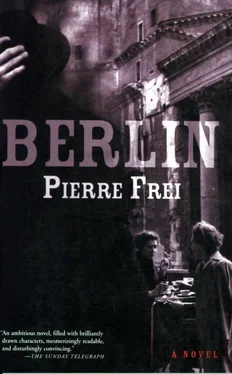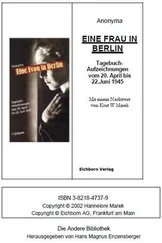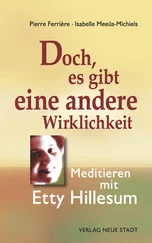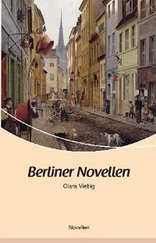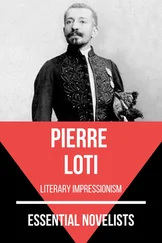Also new to the general appearance of the city were the swastika banners on post offices, and the notices in some shop windows: 'Under Aryan Management'. The familiar Prussian blue of the police uniform had changed to an ugly green that even forestry officials disliked.
The Berliners took all this in their stride. It hailed from distant southern provinces that no one took seriously. They were all agreed: this Austro- Bavarian circus would soon close down again.
The man in the boots and brown shirt at Heidelberger Platz, where Jutta changed from the S-Bahn to the U-Bahn, was also a Berliner first and an SA man second. 'Give generously! The Fiihrer needs warm underclothes,' he shouted, rattling his collection tin for the Nazi Winter Charity fund. 'You wearing brown underpants too?' asked a cheeky boy. 'Only when I got the trots,' was the cheerful answer.
Jutta took the U-Bahn to Onkel Toms Hutte. A few years earlier the architect Doering had built a modern shopping centre there on the sandy soil of the Brandenburg Mark around the station. It was on the same level as the U-Bahn tracks, and thus lower than the street.
The bookshop was in one of the two shopping streets that ran parallel to the two long sides of the station platform. On its left was Zabel's soap shop, on the right was Fraulein Schummel. gentlemen's outfitter. Further right, Herr Muller and Herr Hacker sold and repaired radio sets, while to the left of the soap shop a smell of the North Sea wafted from Ehlers the fishmonger's.
There was a smell of freshly brewed coffee in the bookshop. Jutta's boss drank it all morning, in tiny coffee cups, smoking Egyptian cigarettes with it. In the afternoon she took tea. She was sitting in the back room as usual, reading. Diana Gerold was in her thirties, with short, black hair and a healthy glow from all the tennis she played at the club on Hiittenweg. 'Like a coffee too?'
Jutta poured herself a cup. They opened at nine, which gave her another ten minutes. She pointed to Diana's book. A new publication?'
'No, old stock. Stefan Zweig's novellas. Twenty copies, unsaleable because they've just been banned. Degenerate and un-German, apparently. Although there's hardly a greater master of the German language than Zweig. Unlike the clumping style of one Herr Beumelburg, whose wartime prose the German Book Trade Association so warmly recommends. His publisher is reserving us fifty copies of the latest, with the gentle hint that it wouldn't look good if we take any fewer. Outrageous blackmail, that's what it is.' Diana Gerold had talked herself into a rage.
'Time I opened up.' Jutta dealt with sales and the lending library, while the owner of the shop usually stayed behind the scenes.
Herr Lesch was already waiting: Ewald Lesch, widower, retired postoffice official, a regular customer of the library. 'Good morning, Herr Lesch. We have a new Lord Peter Wimsey in,' she greeted him. Lesch loved English detective stories. She took the Dorothy L. Sayers volume off the shelf.
'I hope it's not a let-down like that Edgar Wallace book. I thought Sanders of the River would be a crime story. Didn't know the man writes about Africa too. I'm not interested in African stories.'
'You could have a nice Agatha Christie,' Jutta said, to mollify him. 'What about Hercule Poirot?' Herr Lesch went away, a satisfied customer. At the door he passed a well-dressed, youngish man, who came in and looked rather helplessly around the shop.
'Good morning, sir. Are you looking for anything in particular?'
'Yes, Hitler's Mein Kampf.' He seemed embarrassed about it.
'Cloth-bound or half-cloth?' asked Jutta in a business-like way.
'Leather-bound, please. Russian leather or morocco. Gold-stamped. India paper if possible.'
'I'm afraid we don't have a de luxe edition like that in stock, sir. Maybe if you tried one of the big bookshops in the city centre…'
'I can order what you want by phone.' Frau Gerold had come into the front of the shop. 'The book distribution people will send it with tomorrow's delivery. Meanwhile, take the half cloth edition to read. We won't charge you.'
'I don't want to read the damn thing. I need a handsome edition for the desk in my new legal offices.'
'Of course, as a good German and an upright National Comrade one likes to have the great work of our Fiihrer and Reich Chancellor always to hand.' Diana Gerold's mouth twisted in a mocking smile.
He gave Jutta his card. 'For when the order arrives.' He was Dr Rainer Jordan, a lawyer. She could tell that he liked her. As I said, I'm new around here, and a bachelor. Would you think it too forward of me to ask you to drink a glass of wine with me after work?'
'Not at all forward, Dr Jordan, I take it as a compliment. But I already have a date this evening.'
'Well, anyway, I hope you have a good day.' He raised his hat.
'Congratulations, an admirer,' said Frau Gerold from the back of the shop.
And a very nice one too,' said Jutta happily. putting Sanders of the River back in its place. She thought of Jochen.
On the dot of seven, when the shop had shut, she was up at the public clock. She could hear the hammering of the engine from a long way off. The little Hanomag, called the Loaf of Bread by the people of Berlin for its shape, turned the corner, hiccuped and stopped. Jochen's hair was untidy as usual, and his tie was crooked as usual too. 'Hello, bookworm,' he cried cheerfully.
'Good evening, teacher, sir!'
Isabel was sitting beside him. Isabel Severin, dark-blonde, grey eyes, tall, slim. She and Jochen were soon to take the state examination, Jochen as a future public-school teacher of German, English and history, while Isabel was going to teach French and geography at the Lyceum.
Never a day without Isabel, thought Jutta crossly. 'Move up a bit.' She squeezed in. 'How was the uni today?'
Jochen started up. 'My viva is going to be about the Merovingians. Isabel winkled that out of Professor Gabler's assistant.'
'I showed him a bit of knee and he turned talkative.' Isabel had legs well worth seeing. 'Will you drive me home?' She sub-let a room in Lynarstrasse. Her mother had died when Isabel was born, her father had married again and gave her an adequate allowance. Apart from that he took no notice of her, and she had no other family, and this was why she had attached herself to Jochen and Jutta. Attached herself rather too closely for Jutta's liking.
She was relieved when Isabel got out. Now she could look forward to the evening with Jochen in his unusual home in an old railway car.
'I'll look in on you two later,' said Isabel, casting a damper on her anticipation. 'I'll bring the transcript of Gabler's lecture on the new national awareness of history. You should slip a little of it into your viva, Jochen. That'll flatter him.'
'Can't we ever be on our own any more?' Jutta complained later.
'Working with her matters to me. She gives good advice.'
'Next thing we know she'll be sitting on the bed with us giving good advice.'
'She sacrifices a lot of time for me, so don't be so touchy.'
'Oh, take me to the S-Bahn, please. I'm going home. Have fun with Isabel,' she said sharply.
The de luxe edition of Mein Kampf was delivered on Friday morning, along with several cookery books and the threatened fifty copies of Beumelburg. 'Put one of them in the window,' said Frau Gerold. 'You can hide it behind French Cuisine.' The telephone rang. 'Your fiance.' She handed the receiver to Jutta.
'Hello, bookworm, how's the printed word today?'
'You read it and you wonder at all the heroic garbage that gets published.'
'That's the trend of modern times.' He sounded perfectly at ease.
She had made up her mind not to bear a grudge. 'Will you collect me at seven this evening?'
'That's why I was calling. The state library stays open late this evening.
Читать дальше
